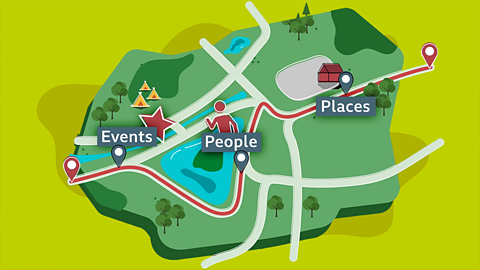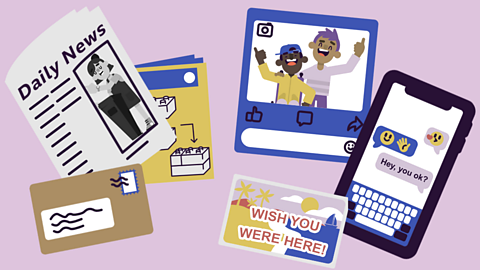Did you know?
Science fiction author Robert A Heinlein once wrote:
Autobiography is usually honest but never truthful.
Introduction to writing autobiography
Key learning points
- What is an autobiography?
- Where does the word autobiography come from?
- Understand why autobiographies are written
- How to structure an autobiography
Video about writing autobiography
A video about what an autobiography is, how to start an autobiography and examples of autobiographies
An autobiography is the story of a person’s life. It is different to a diary, which is usually a personal account of events but as they happen. And it’s different to a biography, which is the story of someone’s life, but written by somebody else.
There are different ways to tell the story of someone’s journey through life. Using a traditional story arc, with a clear beginning, middle and ending, can make an autobiography more interesting and engaging.
You can start at the beginning, your birth, and describe the journey from there.
Or you can start later in your story, at the point when you made an important decision, took part in a memorable event or tried something for the first time.
Wherever you choose to start, it’s important to describe key places and events, the different things you saw and did.
As with any story, pick the events, people and places that will capture the reader’s interest and imagination and maybe leave the boring bits out!
Don’t just list events or anecdotes, piece together a story.
Did an event change the way you think about things? Did it offer you new opportunities? What did you learn from your experience?
For example, when Roald Dahl wrote his first autobiography, Boy, he chose to focus on his school years.
He tells the story of his local sweet shop and his dreams of being an inventor for a chocolate company. No wonder he wrote Charlie and the Chocolate Factory!
So, autobiography can come out in all kinds of ways. Which things in your life will you write about?
Etymology of autobiography
Etymology is the study of the origin and history of words. The word ‘autobiography’ has Greek origins. It’s helpful to divide the word into sections to see how the meaning of this word has developed. You may already be familiar with the word ‘biography’, which means to write about someone else’s life.
The word ‘autobiography’ has the following etymology:
Autos (self, one's own, by oneself, of oneself)
+
Bios (to life)
+
Graphia (record or account)
Therefore,
Autobiography = an account of one’s own life.
Although the word itself was first used in the 18th century, there are examples of writers recording their own life experiences from ancient civilisations, including Egypt and Greece.
What is an autobiography?
An autobiography is a life story about oneself. It can be a book, a collection of letters, diaries or memoirPersonal accounts of historical events and observations. .
Some autobiographies are formal and provide personal insight on powerful figures and their role in key events, for example, Becoming by Michelle Obama or Long Walk to Freedom by Nelson Mandela.
Others are informal and about the lives of average people (Smile by American cartoonist Raina Telgemeier), famous people (Will by Will Smith) or the unique experiences of people (The Diary of a Young Girl by Anne Frank).
Autobiographies are written for a variety of reasons and there are a variety of types:
- A full autobiography, detailing someone's life from childhood through to old age.
- An autobiography based around a theme and which details universal or life-changing experiences.
- A confessional autobiography revealing deep and personal life experiences.
- An account of overcoming adversity, illness, imprisonment, trauma, war or other challenges.
Why write an autobiography?
There needs to be purposeThe reason for and aim of your writing. and something of interest to say before writing an engaging autobiography.
Famous people often write their autobiographies, but this doesn’t mean that writers must be well known. Some autobiographies are fascinating because they record the lives of ordinary people.
Autobiographies are often retrospective Look back at events, experiences and any developments in their life. .
A life story could:
- provide lessons for readers
- record important historical events form a personal viewpoint
- allow the reader to understand their own life experiences better
- entertain the reader
Selecting moments from life
Autobiographies are a collection of important moments which allow readers to understand the origins of a person, their behaviour, thinking, feelings, experiences and motivations.

Every single detail of a person’s life cannot be included. However, there are some key moments that may be considered important:
- The early years of someone’s life, including their place of birth, dates and key early experiences that shaped them.
- Key experiences and interactions that shaped life perspectives.
- Unique personal experiences that were challenging and resulted in personal growth. This could include failures, falling in-love, loss, illness, rejections, conflict, friendship, loneliness, and success.
- Details about training, hobbies and work, discussing what was learnt, gained, or lost.
- Life changing events that were outside of one’s life, This might include local, national, global factors such as economic recessions, wars, environmental disasters, laws and policies, and changes in governments.
How to structure an autobiography
The start
Some autobiographies start at the beginning of the writer’s life, others choose to begin with a life-changing moment such as a tragedy, success or unusual event. A memoir is a type of autobiographical writing that focuses on an important event or period of the writer’s life.
The middle
The main part of the autobiography will be the important experiences, relationships and life choices the writer has made. Each section or chapter will contribute to showing how a person came to be the person they are.
Some writers divide their life story over several books. For example, the writer Maya Angelou wrote her autobiography over a series of volumes, with the first book dealing with her early life.
The end
A conclusion could highlight key achievements, the life-lessons learnt and include future plans. The ending could leave the door open for future autobiographies as the writer still has more of life to experience.
Autobiography as a starting place for fiction
There are two types of fictionalised autobiographies that can be easily confused:
Semi-autobiographical
Real life autobiographies that include fictional elements are semi-autobiographical. Semi-autobiographies can reorder the truth and events, change the location, names, dates and add fictional elements for dramatic impact. For example, Oranges Are Not the Only Fruit by Jeanette Winterson.
Fictional autobiographies
Fictional autobiographies of made-up characters, plots, and events copy the style of an autobiography. The details can be inspired by real life, but the work is fiction. For example, David Copperfield by Charles Dickens, Memoirs of a Geisha by Arthur Golden and The Colour Purple by Alice Walker.
Test your knowledge
Secondary games. gameSecondary games
Have fun playing science, maths, history, geography and language games

More on Non-fiction writing
Find out more by working through a topic
- count7 of 10

- count8 of 10

- count9 of 10

- count10 of 10
